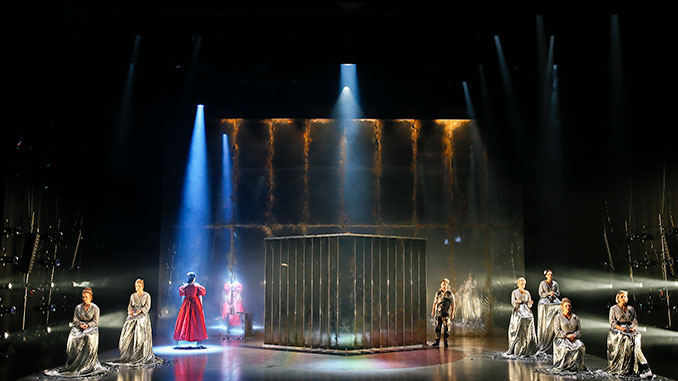 It is a truism to say that the ancient myths will always be with us because they talk to us of fundamental things; just when we think we’ve heard them one time too many, someone comes and shows us how relevant they can be.
It is a truism to say that the ancient myths will always be with us because they talk to us of fundamental things; just when we think we’ve heard them one time too many, someone comes and shows us how relevant they can be.
The trick in retelling them, though, is to refract them through a contemporary lens without losing their epic, ritualistic qualities – that, after all, is where their power lies. Victorian Opera present us with two one-act operas that do precisely this, albeit in vastly different ways. It makes for a potent night at the theatre.
Cassandra is up first, composed and conducted by Simon Bruckard, with a libretto by Constantine Costi. The myth of Cassandra comes from Homer’s Iliad, later elucidated by Aeschylus and Euripides. She was the daughter of King Priam, and cursed by Apollo to foresee the future but never be believed.
She could predict the fall of Troy but was powerless to stop it, or save the lives of any of her loved ones. Later she was taken by Agamemnon to Greece, only to be murdered by his wife Clytemnestra. Bruckard and Costi aren’t interested in this, however; they concentrate on the curse and the events leading up to it.
Sources differ on this point: some say Cassandra traded her body to Apollo for the gift of foresight but then reneged on the deal; some say Apollo lured her with the power but when she refused to have sex with him he attached the awful curse.
In this version, in a deliciously modern setting designed by Anna Cordingley and lit by Paul Jackson, Apollo (Sam Sakker) is a downright sleaze – all gold chains and polyester tracksuit – and Cassandra (Shakira Dugan) a bored sophisticate. Initially, it seems this reading may be too flat, the characterisations too prosaic for the deeper resonances underpinning the tale. Cassandra calls Apollo “a prick” and demands he pay for her Uber.
But Bruckard and Costi know what they are doing, letting us see this blundering seduction scene for the act of bastardry it always was – Apollo was a notorious rapist who gave even his own father Zeus a run for his money – without sacrificing that sense of the epic, those metaphorical stirrings sitting beneath the events.
The score, jittery and discordant, edged with the kind of tensions usually associated with jazz, suddenly shifts when the curse is placed; there is a profound welling as if from the depths, as Apollo whispers in Cassandra’s ear “you’ll never be believed.” It’s chilling.
The second half is dedicated to the myth of Echo and Narcissus, which first appeared in Ovid’s Metamorphoses and subsequently wormed its way into the world’s cultural psyche.
Composed by Kevin March with libretto by Jane Montgomery Griffiths, this piece takes a far more lyrical approach to the mythos, setting the tale in an almost Wagnerian milieu, with transcendent dappled light and a female chorus in scaled gowns that recalls the Rhinemaidens.
Echo (Kathryn Radcliffe) is doomed by Juno for a minor slight, her voice reduced to repetitions of the last thing she hears. When she falls in love with Narcissus (Nathan Lay) she comes up against an age-old problem: he’s so in love with himself, he barely notices her. She turns into stone, he turns into a flower and everyone lives happily never after.
While March’s score is lush and layered, with the musical themes and call and response cadences cleverly utilising Echo’s curse, the piece is not quite as successful as Cassandra. It’s not as taut, and Griffiths’ libretto tilts occasionally into turgidness.
The long section where Narcissus gazes lovingly at himself is more lugubrious than pitiful, the score veering almost into musical theatre terrain, and the sense of yearning at the heart of the story is more plaintive than piercing. It does have a gorgeous, soaring ending though, and the singing is divine.
In fact, all the singers are excellent. Dugan’s low, richly sensuous mezzo-soprano gives her scope to flesh out the character’s tragic register, and Sakker is forceful as a particularly odious god/bogan.
Lay has a lovely clean tenor, even if his part is underwritten, but best of all is Radcliffe as the flighty, doomed nymph. Her crisp, warm soprano runs effortlessly over the top of the music, and the delicacy of her phrasing gives the role a heartbreaking melancholic core from which the emotion wells. She’s certainly a singer to watch.
Sam Strong directs this double bill with a surety of vision and a lot of class. Both pieces are allowed space to develop, but there are also clever design elements that link them, from Cordingley’s dazzlingly effective set to Jackson’s rich, expressive lighting.
We may have thought tumbling confetti went out of theatrical style in the early 2000s, but the effect is beautifully judged here, washing the stories in a fairytale ambience without losing those contemporary resonances. This kind of small-scale original opera isn’t being made much across the country, and this pair of morsels makes you wonder why there isn’t more of it.
Cassandra | Echo and Narcissus
Playhouse – Arts Centre Melbourne, 100 St. Kilda Road, Melbourne
Performance: Wednesday 17 March 2021 – 7.30pm
Season continues to 20 March 2021
Information and Bookings: www.victorianopera.com.au
Image: Kathryn Radcliffe, Nathan Lay and Female Chorus in Echo and Narcissus – photo by Jeff Busby
Review: Tim Byrne
